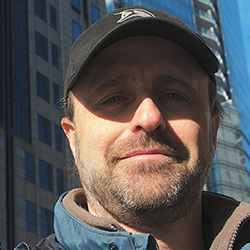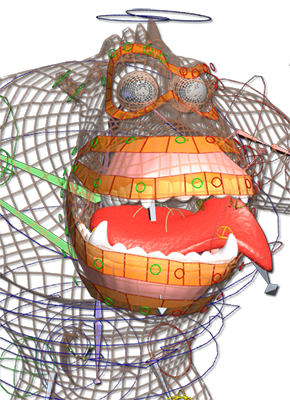Interview by: Amid Rajabi

1- Hi Paul let me start by you first, please explain to our readers about yourself and where you started all this from and your interest in this subject?
I started in this business 20 years ago when I was 30 after taking a college course where the faculty didn't have a clue about 3D, so all in all I'm self taught on the whole subject. My interest came from a friend of mine that suggested that I get into the business as he had been doing since the very earliest days. For me it was finally an artistic outlet that I would be able to make money doing. Prior to the 3D business I was in the financial sector and before that I was in the restaurant business.
2- We know about you mostly through the world of Rigging. Do you think you can tell us a bit more about Rigging and why you chose it?
I didn't start out doing rigging, at that time anyone in the business was a generalist and clear separation in the positions really hadn't been defined at anything other than the very biggest shops. I started working with my friend that got me started in the business and soon found out jobs becoming larger and more complex. As we went on I had to find ways to make things work and that led to rigging at first. I think that I was one of the first people doing reasonably decent character rigs in Max. I was soon offered a position at Walt Disney Studios to train them but soon found myself working on several of their productions at the time. One was the feature Return to Neverland where I worked on everyone of the 3D shots in the film from layout, modeling, texturing, rigging through to animation and final rendering and compositing.
3- Why did you set up Pen Productions and what objectives are you following?
I set it up as there is so much freelance work in the 3D business. From there it grew into doing small productions mostly for the technical side of the business but also modeling and texturing. At this point in time PEN is mostly just myself again doing freelance for companies around the world. I specialize in solving production problems from pipeline, rigging to writing tools and plugins.
4- We know you are an expert at Programming and you have written a number of plugins for 3ds Max software. Can you tell us why you chose Programming?
Programming is just an extension of anything technical with 3D. As you get deeper into rigging you hit a wall and need to find ways to make the software do what it wasn't meant to do out of the box. Programming allows you to do whatever you want, it allows you to see beyond the base software.
5- What companies have you worked for and what projects have you participated in and what role you have had in those projects?
I have not worked for many companies, in fact as an employee I have only worked for one and that was Red Rover in Toronto, Canada. I was hired on to start their 3D production department as at the time they were a 2D house doing commercial work. My client list however is very long including 2K Games, Rock Star Games, Tombolo (Disney Production), 23 Lunes and Pasozebra in Spain, Hatch and Redrover Studios in Toronto, Disney as well as Lockheed Martin Areospace working on satelite production. There have been many more around the world and closer to home. Primarily I have been involved in Modeling, texturing and technical work but I have worn just about every hat at one point or another.

6- In your opinion what are the differences amongst 3ds Max , SoftImage and Maya, etc… within Rigging?
I don't really know XSI very well to comment other than I wish I had ICE to use in Max. As far as the differences they all really do the same things it is just that each goes about it a different way. The principals are all the same however and the way that animators want to work is always the same. If I had to choose one to move into the future with it would be XSI however there isn't the user base for it so for now it will have to stay as Max and Maya as my production tools.
7- How do you keep yourself updated and what sources do you use?
I mostly keep up to date by reading articles on the internet and then playing with the tools as often as I can. I have learned everything that I know by always setting aside a portion of the day for learning new things no matter how busy I am. If I don't do this I will very quickly slip behind in production knowledge and would not be of use any more. This, as most, is a very competitive market.
8- Do you believe a good artist can also be a good instructor?
Not in every case as some people just don't have the needed skills to pass on what they know to others. I have been doing both the whole time that I have been in this business. I'm also a professor at Humber College in Toronto where I teach all things 3D.
9- There are many people who are interested in Rigging and are keen on becoming professional in this field and are most probably inexperienced at Programming. What do you suggest to them and where do you think they should start from and what path they should take?
If you are going to be a rigger of any kind you at least need to know the built in language of the software that you are working in. For Max that is Max Script and for Maya it would be MEL/Python. If you don't know these you are not working efficiently and are unable to solve the most difficult problems quickly and effectively. Knowing lower level languages like C# and C++ are not necessary to begin with but you will probably end up there at some point.
10- Having been chosen as 3ds Max Master is one of your achievements, what was your feeling on the day you heard about this?
That was a very nice surprise, to this day I still don't know who nominated me. It is always nice when you are recognized for the things that you have worked so hard for.
11- What’s your opinion about cgphd website and online training?
cgphd looks like an interesting web site but it is not in english so I can't really look around it much. Online learning is the way most people are going these days. I run Master Classes from PEN from time to time and I think that if the instructors are knowledgeable and the content is relevant it can be an excellent way to quickly expand ones abilities.